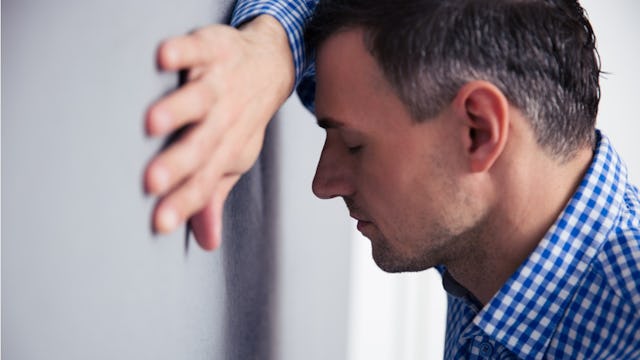Dads, Your Mental Health Is Important Too

The deeper I get into this parenting thing, the more I realize that one of the most important things I can do for my kids is to take care of my own mental health.
We all get into bad moods. We all lose our shit sometimes — that’s just the price you pay for being a parent to young humans. But when depression and anxiety become a daily part of our existence, we need to realize how profoundly it can affect our kids. And we need to address it pronto, for our family and for ourselves.
As a lifelong anxiety sufferer, I can see a direct correlation between times that my anxiety spikes and the deterioration of my kids’ moods and behavior. When I’m having panic attacks — even when I retreat to another room to have them — my kids pick up on my change in demeanor. My anxiety fills the house with its hungry claws. It makes my kids more likely to cry, to get in my face with their big, fat tears as if to say, “Mommy, your anxiety is scaring us.” But they don’t always have the words for that, and so they kick and scream and throw their lunch across the room.
When I realized a few years ago how directly my moods affect my kids’ moods, I decided I couldn’t mess around anymore and needed to make daily self-care for my mental health a top priority. This commitment to my mental wellness is also the reason I’ve recently returned to therapy. Whether it is therapy, medication, or a combination of both, the most important thing you can do to address your mental health is to work with a trained mental health professional.
Yes, there are other supportive measures we can take to help cope. Yoga, meditation, exercise, naps — different things work for different people, but none of them replace seeking care and advice from a medical professional.
With 16 million people having at least one depressive episode a year, that means that all of us need to take our mental health seriously. And remember, depression and anxiety doesn’t discriminate — not by race, class, gender, or anything else. And yes, that means men are just as likely to suffer from depression and anxiety as women.
But did you know that men are much less likely to seek help for it? A survey by the Mental Health Foundation, for example, found that men are much less likely to look for professional help for their mental health issues and are also less likely to disclose (or admit) to family and friends that they have issues in the first place.
Now, I’m not looking to knock all the self-realized men out there (I know you exist!), but I think most of us don’t need to read a study to know that this is the case for the majority of men. It’s not entirely their fault either; most men just haven’t been raised to take their mental health as seriously as women. Society tells men to “suck it up” and “walk it off.”
This is bullshit for so many reasons, but one of the top ones that I can think of — at least from the perspective of a parent — is that when men become dads, whatever untreated mental health issues they have can seriously affect their kids. (And let’s not forget that sometimes the stress of parenthood can exacerbate whatever issues a person already has going on.)
A recent study that came out in Social Work Research gives a clear example of exactly how this works. The researchers looked at how a dad’s mood affects his adolescent children, and found that a dad’s depression had major effects on the “internal and external” behavior of his kids. These behaviors included withdrawal, anxiety, anger, and aggression.
Furthermore, the study found that a dad’s depression had an even bigger impact on his kids than a mom’s depression, since mothers tend to express their depression in more subtle ways than dads. “Kids probably pick up on their dad’s depression in ways they don’t with mothers,” Kevin Shafer, one of the authors of the study, tells Science Daily. “Men are more likely to show anger and frustration. Children are going to notice, and it’s going to affect them.”
Shafer adds the important fact that this particular study is one of only a few studies that looks at the way a dad’s mental state affects his kids. “Many studies look at moms who are depressed and how they impact children,” says Shafer. “Very few looked at how depressed fathers influence their children.” Shafer and his fellow researchers believe that we need more studies that explore these issues — and overall, more discussion of what can be done to address and care for men’s mental health.
And to that I say, hell-to-the-freaking-YES. Truly, our men, our dads, our families, and our entire world need a makeover when it comes to how we address men’s mental health. So many of us act like boys and men don’t have the same BIG FEELINGS that women and girls do. But that is absolutely false; the problem is that they have been taught all their lives to suppress them.
And when those feelings blow up (and yes, they do, no matter what we would like to believe), there is no clear path for addressing them, at least for the majority of men. This can have painful, and even dangerous consequences, for all involved.
So if you have a male partner who is suffering, please let him know that it’s okay to seek help. In fact, it’s one of the strongest and most powerful things he can do. And if he’s a dad, let him know that getting help is hands-down one of the greatest things he can do for his kids — and for the next generation of kids to come.